- Details
- HDD/SSD
![]() CDRLabs has put together a brief review of Silicon Power's new USB 3.0 portable hard drive, the Diamond D20. Available in 500GB and 1TB capacities, this lightweight, ultra-slim drive features a solid aluminum metal structure with a unique carbon-like texture and scratch resistant surface. The Diamond D20 is also equipped with a built-in LED status indicator and a SuperSpeed USB 3.0 interface which allows transfer speeds up to 10x faster than USB 2.0. To top it all off, the Diamond D20 works with Silicon Power's SP Widget backup and security software and is covered by a 3-year warranty.
CDRLabs has put together a brief review of Silicon Power's new USB 3.0 portable hard drive, the Diamond D20. Available in 500GB and 1TB capacities, this lightweight, ultra-slim drive features a solid aluminum metal structure with a unique carbon-like texture and scratch resistant surface. The Diamond D20 is also equipped with a built-in LED status indicator and a SuperSpeed USB 3.0 interface which allows transfer speeds up to 10x faster than USB 2.0. To top it all off, the Diamond D20 works with Silicon Power's SP Widget backup and security software and is covered by a 3-year warranty.
- Details
- HDD/SSD
![]() Today, CDRLabs brings you a review of Silicon Power's new Slim S55 SSD. Designed for the cost-conscious consumer looking to upgrade their system to a SSD, this 7mm thick S55 is powered by Phison's PS3108-S8 processor and features a SATA 6GB/s interface, TRIM support and garbage collection technology. The drive is also equipped with up to 480GB of MLC NAND flash and a 512MB cache to deliver up to 556 MB/s read and 500 MB/s write speeds and a maximum of 80,000 4KB random write IOPS.
Today, CDRLabs brings you a review of Silicon Power's new Slim S55 SSD. Designed for the cost-conscious consumer looking to upgrade their system to a SSD, this 7mm thick S55 is powered by Phison's PS3108-S8 processor and features a SATA 6GB/s interface, TRIM support and garbage collection technology. The drive is also equipped with up to 480GB of MLC NAND flash and a 512MB cache to deliver up to 556 MB/s read and 500 MB/s write speeds and a maximum of 80,000 4KB random write IOPS.
- Details
- HDD/SSD
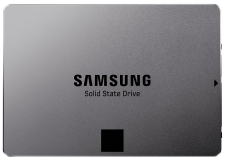 CDRLabs kicks off the week with a review of Samsung's 750GB SSD 840 EVO Series solid state drive. The drive is powered by Samsung's new MEX controller and is available with up to 1TB of their second generation 3-bit/cell MLC NAND. To overcome the slow write speeds typically associated with this type of NAND, Samsung has increased the size the DRAM cache and implemented an innovative write acceleration algorithm called TurboWrite, which creates a high-performance write buffer in the SSD. The SSD 840 EVO is also the first drive to support Samsung's new RAPID technology. By using free PC memory as a cache, RAPID can push the performance of the SSD beyond the limits of the current SATA specification.
CDRLabs kicks off the week with a review of Samsung's 750GB SSD 840 EVO Series solid state drive. The drive is powered by Samsung's new MEX controller and is available with up to 1TB of their second generation 3-bit/cell MLC NAND. To overcome the slow write speeds typically associated with this type of NAND, Samsung has increased the size the DRAM cache and implemented an innovative write acceleration algorithm called TurboWrite, which creates a high-performance write buffer in the SSD. The SSD 840 EVO is also the first drive to support Samsung's new RAPID technology. By using free PC memory as a cache, RAPID can push the performance of the SSD beyond the limits of the current SATA specification.
- Details
- HDD/SSD
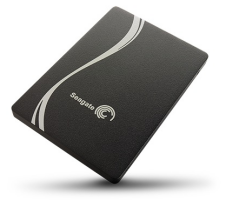 CDRLabs has taken an in depth look at Seagate's 600 SSD. Available in both 7mm and 5mm z-heights, the 600 SSD is the ultimate laptop upgrade for road warriors, power users, executives and gamers. With no moving or mechanical parts, this drive is more rugged and shock-resistant than standard hard drives. The 600 SSD also combines Link A Media Devices' (LAMD) LM87800 controller with Toshiba's 19nm Toggle mode MLC NAND flash to deliver faster boot up speeds, shorter application load times and improved system responsiveness.
CDRLabs has taken an in depth look at Seagate's 600 SSD. Available in both 7mm and 5mm z-heights, the 600 SSD is the ultimate laptop upgrade for road warriors, power users, executives and gamers. With no moving or mechanical parts, this drive is more rugged and shock-resistant than standard hard drives. The 600 SSD also combines Link A Media Devices' (LAMD) LM87800 controller with Toshiba's 19nm Toggle mode MLC NAND flash to deliver faster boot up speeds, shorter application load times and improved system responsiveness.
- Details
- Other
 Today, CDRLabs takes a look at StarTech's new PCIe SATA III RAID controller cards. Based on Marvell's 88SE9230, the PEXSAT34RH and PEXSAT34SFF are fully compliant with the SATA 3.0 specifications and support hardware RAID 0, 1, and 1+0 modes. Port Multiplier FIS-based and Command-based switching is also supported on all ports, enabling multiple SATA drives to be connected using a single cable, for a total of 7 drives. The cards also feature support for Marvell's HyperDuo SSD auto-tiering technology, which balances the performance advantages of SSD storage with the cost-effectiveness and large capacity of standard hard drives. The technology uses intelligent algorithms to automatically migrate hot data to SSDs, while enabling all data to be safely stored on larger capacity hard drives.
Today, CDRLabs takes a look at StarTech's new PCIe SATA III RAID controller cards. Based on Marvell's 88SE9230, the PEXSAT34RH and PEXSAT34SFF are fully compliant with the SATA 3.0 specifications and support hardware RAID 0, 1, and 1+0 modes. Port Multiplier FIS-based and Command-based switching is also supported on all ports, enabling multiple SATA drives to be connected using a single cable, for a total of 7 drives. The cards also feature support for Marvell's HyperDuo SSD auto-tiering technology, which balances the performance advantages of SSD storage with the cost-effectiveness and large capacity of standard hard drives. The technology uses intelligent algorithms to automatically migrate hot data to SSDs, while enabling all data to be safely stored on larger capacity hard drives.
- Details
- Blu-ray Drives
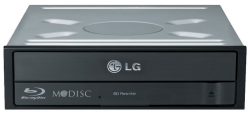 CDRLabs kicks off the week with a review of LG's first 16x Blu-ray Disc rewriter, the BH16NS40. This new Super Multi Blue drive is capable of 16x BD-R, 12x BD-R DL, 6x BD-R LTH and 2x BD-RE writing speeds and a maximum BD-ROM read speed of 12x. The BH16NS40 also offers support for 3 and 4-layer BDXL media as well as Millenniata's M-DISC technology which uses an inorganic rock-like material to provide up to 1000 years of permanent data storage.
CDRLabs kicks off the week with a review of LG's first 16x Blu-ray Disc rewriter, the BH16NS40. This new Super Multi Blue drive is capable of 16x BD-R, 12x BD-R DL, 6x BD-R LTH and 2x BD-RE writing speeds and a maximum BD-ROM read speed of 12x. The BH16NS40 also offers support for 3 and 4-layer BDXL media as well as Millenniata's M-DISC technology which uses an inorganic rock-like material to provide up to 1000 years of permanent data storage.
- Details
- HDD/SSD
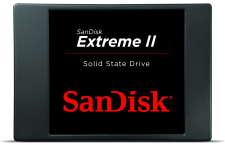 Today, CDRLabs brings you a review of SanDisk's new Extreme II SSD. This ultra-slim SSD is powered by Marvell's 88SS9187 "Monet" controller and is equipped with SanDisk's new 19nm eX2 ABL MLC Toggle NAND flash to deliver up to 550 MB/s sequential read and 510 MB/s sequential write speeds. The Extreme II also packs a sizeable DRAM cache and offers features like TRIM support, wear-leveling, background garbage collection and SanDisk's nCache technology which uses a large non-volatile SLC cache to improve random write performance.
Today, CDRLabs brings you a review of SanDisk's new Extreme II SSD. This ultra-slim SSD is powered by Marvell's 88SS9187 "Monet" controller and is equipped with SanDisk's new 19nm eX2 ABL MLC Toggle NAND flash to deliver up to 550 MB/s sequential read and 510 MB/s sequential write speeds. The Extreme II also packs a sizeable DRAM cache and offers features like TRIM support, wear-leveling, background garbage collection and SanDisk's nCache technology which uses a large non-volatile SLC cache to improve random write performance.
- Details
- HDD/SSD
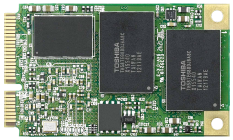 Today, CDRLabs brings you a review of Plextor's new 256GB M5M Series mSATA SSD, the PX-256M5M. Designed for ultrabooks, tablets and other portable devices with limited space, the M5M provides high-performance and reliability in a space one-eighth the size of a standard 2.5 inch drive. This pint-sized SSD combines Marvell's 88SS9187 "Monet" controller with Toshiba's 19nm Toggle Mode MLC NAND to deliver up to 540MB/s read and 430MB/s write transfer rates. The M5M also supports Plextor's True Speed and True Protect technologies as well as the SATA Device Sleep (DEVSLP) standard which extends the battery life of a device by reducing the drive's power consumption when its not in use.
Today, CDRLabs brings you a review of Plextor's new 256GB M5M Series mSATA SSD, the PX-256M5M. Designed for ultrabooks, tablets and other portable devices with limited space, the M5M provides high-performance and reliability in a space one-eighth the size of a standard 2.5 inch drive. This pint-sized SSD combines Marvell's 88SS9187 "Monet" controller with Toshiba's 19nm Toggle Mode MLC NAND to deliver up to 540MB/s read and 430MB/s write transfer rates. The M5M also supports Plextor's True Speed and True Protect technologies as well as the SATA Device Sleep (DEVSLP) standard which extends the battery life of a device by reducing the drive's power consumption when its not in use.
- Details
- HDD/SSD
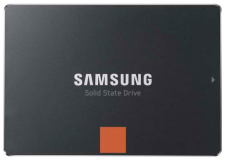 CDRLabs has taken an in depth look at Samsung's 512GB SSD 840 Pro Series solid state drive. Designed and built completely in-house, the SSD 840 Pro is powered by Samsung's own triple-core MDX controller and features a SATA 6GB/s interface, specially-engineered wear-leveling and garbage collection algorithms and AES 256-bit full disk encryption. The drive also packs up to 512MB of cache and is equipped with Samsung's Toggle DDR2 NAND flash memory to deliver up to 540MB/s read and 520MB/s write speeds.
CDRLabs has taken an in depth look at Samsung's 512GB SSD 840 Pro Series solid state drive. Designed and built completely in-house, the SSD 840 Pro is powered by Samsung's own triple-core MDX controller and features a SATA 6GB/s interface, specially-engineered wear-leveling and garbage collection algorithms and AES 256-bit full disk encryption. The drive also packs up to 512MB of cache and is equipped with Samsung's Toggle DDR2 NAND flash memory to deliver up to 540MB/s read and 520MB/s write speeds.
- Details
- Network Storage
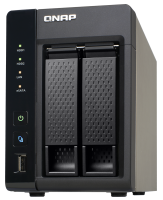 Today, CDRLabs brings you a review of QNAP's two-bay TS-x69L series Turbo NAS, the TS-269L. Designed to meet the needs of home and small office users, the TS-269L is powered by a dual-core Intel Atom processor and comes equipped with 1GB of DDR3 RAM, dual Gigabit Ethernet ports, two USB 3.0 ports and a 512MB DOM (Disk on Module) with dual firmware image design. Like QNAP's other Turbo NAS servers, the TS-269L offers a long list of features including cross-platform file sharing, centralized storage and backups for Windows, Mac and Linux users. It can also stream multimedia content to network media players or play it directly on the TV in the living room using its built-in HDMI port and HD Station.
Today, CDRLabs brings you a review of QNAP's two-bay TS-x69L series Turbo NAS, the TS-269L. Designed to meet the needs of home and small office users, the TS-269L is powered by a dual-core Intel Atom processor and comes equipped with 1GB of DDR3 RAM, dual Gigabit Ethernet ports, two USB 3.0 ports and a 512MB DOM (Disk on Module) with dual firmware image design. Like QNAP's other Turbo NAS servers, the TS-269L offers a long list of features including cross-platform file sharing, centralized storage and backups for Windows, Mac and Linux users. It can also stream multimedia content to network media players or play it directly on the TV in the living room using its built-in HDMI port and HD Station.

